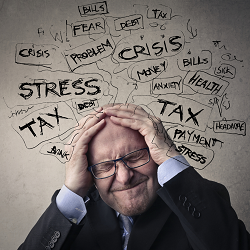Today, we often used the terms “being stressed out” and “having anxiety” interchangeably. But just how similar (or different) are they?
Stress versus anxiety.
Stress is our body’s natural response to an external trigger. When we feel stress in the short-term, from things such as a first date, a deadline at work, or a family gathering, our bodies release the stress hormone cortisol. We may feel short of breath, a racing heartbeat, and sweaty palms. In the short-term, stress serves us well and helps us deal with danger.
Ideally, when the stress trigger subsites, so does the stress response. However, it’s not uncommon for people today to experience chronic stress, meaning stress that does not subside but instead is prolonged indefinitely. Think: financial debt, unhealthy relationships, a global pandemic.
Anxiety, on other hand, is an experience that is triggered internally. It begins and ends in our minds. Anxiety causes mental spiraling and constant worry about the past, the future, our job, finances, body image, relationships, and all the other thoughts that keep us awake at night. Unlike stress, it’s often difficult to precisely pinpoint the cause of anxiety.
In small doses, anxiety can be a useful mechanism that our bodies use to let us know when something isn’t right. However, in today’s world, chronic anxiety has become increasingly common, and our busy lifestyles don’t allow us to slow down enough to internally investigate the cause. This is when anxiety can lead to more severe mental and physical health conditions.
How do I know if what I am feeling is stress or anxiety?
Stress and anxiety both are our body’s natural responses to danger. When our system goes into a flight-or-fight response, stress and/or anxiety are triggered in the body to keep us alert and focused. Consequently, it can be difficult to tell the difference between the two because they share many of the same symptoms. However, for mental and physical health, it is important to learn to do so.
The main thing to understand is that stress is a response to an external and identifiable threat, whereas the cause of anxiety is internal and more difficult to pinpoint. Stress tends to flare up quickly and then dissipate, whereas anxiety can linger indefinitely. While both can cause a racing heartbeat and rapid breathing, stress tends to result in overall unhappiness and crankiness, and anxiety results in restlessness and tension.
When to seek treatment.
It is important to know when to seek treatment for your mental health because both chronic stress and anxiety will weaken the immune system and negatively impact your quality of life.
Our bodies weren’t made to be in flight-or-fight for more than short periods at a time. Think of it like this: stress is great when we encounter a tiger in the wild and need to act quickly in order to save our life. That sudden and intense flood of cortisol is natural for the body, but experiencing constant stress and constant flooding of cortisol is damaging to our systems, especially over the long-term.
Along those lines, feeling anxious sometimes in and of itself isn’t a negative thing. But when anxiety becomes the lens through which you experience life or begins to interfere with your ability to function in the day-to-day, professional treatment is recommended. The good news is that with the right kind of care, both chronic stress and anxiety can be treated.
Treatment.
A good first step in treating chronic stress or anxiety is to get a professional assessment. Whether you require prescribed medication or not, seeing a therapist as part of a treatment plan is always a good idea. A good therapist will support you in discovering the causes of stress and anxiety in your life as well as teach you tools and techniques for managing both. Remember, mental and emotional health are just as important to our overall well-being as physical health.
Other avenues to treat stress and anxiety include relaxation techniques and exercise. Knowing when to take a step back from a stressful situation or how to use breathwork and meditation to increase feelings of grounded peacefulness is essential. Daily movement and time in nature are also great ways to increase peacefulness and decrease stress and anxiety.
Still not sure where to start? Our mental health professionals at The Relationship Therapy Center in Roseville and Fair Oaks, Ca. are here to help you. Contact us today to talk to one of our therapists or to schedule an assessment. We look forward to working with you.
Other Services offered at The Relationship Therapy Center in California:
In addition to anxiety treatment, Our Sacramento area counseling clinics located in Roseville and Fair Oaks, CA are pleased to offer a variety of mental health services. We will discuss the importance of self-care and emotional support to help you cope and to discover ways to find healthy ways of dealing with stress.
Anxiety treatment can be beneficial, with the right therapist. Our compassionate therapists are trained to walk you through the process and help you find healing and peace. Please contact our therapy office to learn more about the many ways we can help you and your loved ones heal, grow, and love healthy.



